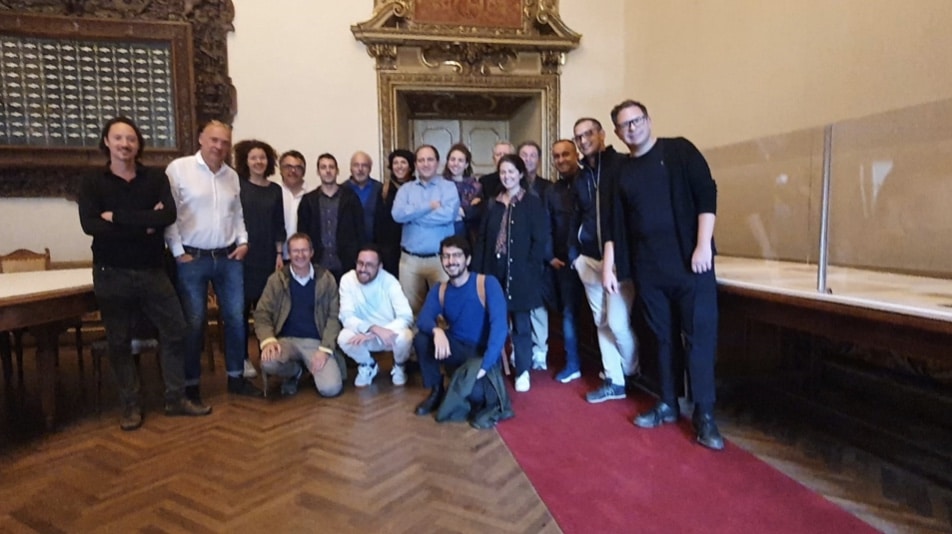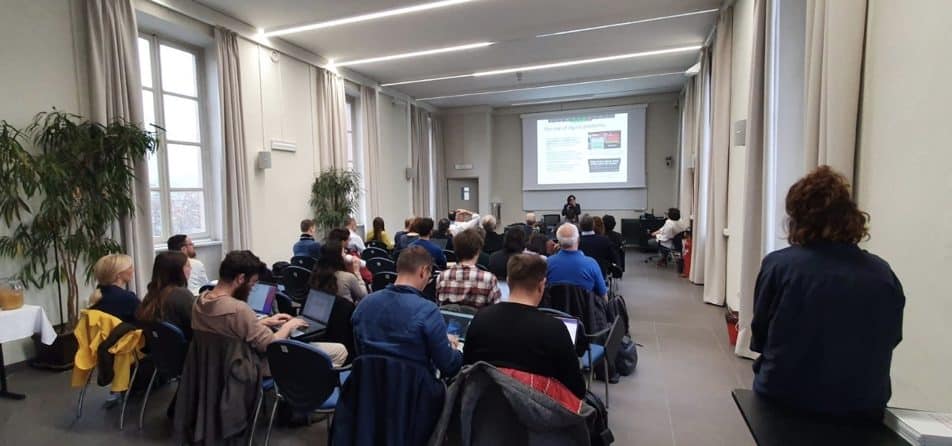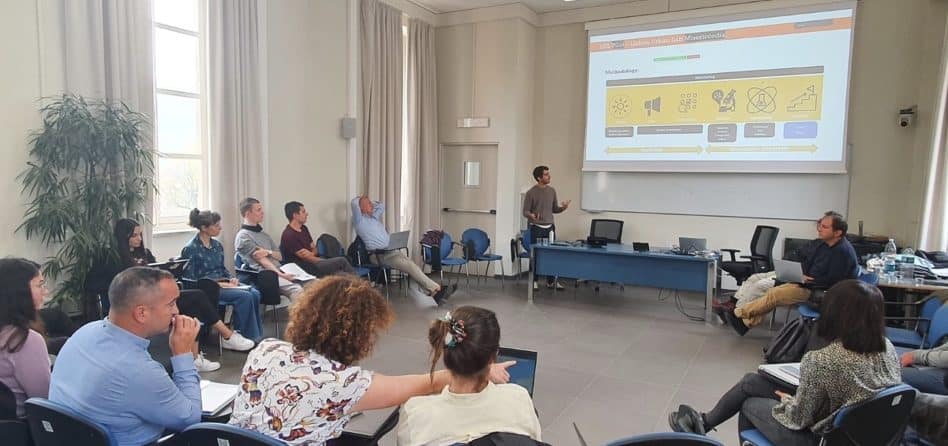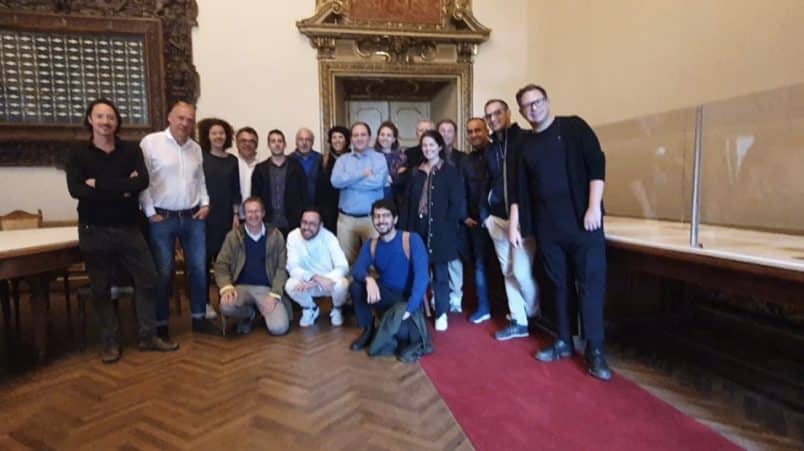Last month saw Prof. Guido Stompff and me and take the train through the Alps for the latest consortium meeting on the SMARTDEST project in Torino, Italy. Bringing together partners from across Europe and the Mediterranean for the first time since the project began in early 2020. The meeting was an opportunity to compare progress in the City Labs phase of each case study – which includes the establishment of a set of field labs to support citizen engagement, and co-design of service innovation and policy solutions. One of the concluding stages of the research process, City Labs invites identified stakeholders in each city to take part in a participatory process, “aiming at elaborating solutions in the face of social exclusionary processes produced by tourism motilities, scaling up small-scale coping tactics to social and policy innovation“ (SMARTDEST, 2022). Centering the lived experience of citizens allows for the collective imagination of, “models that are inclusive, gendered, just, and accomplish a shift towards cities that are more socially resilient in the face of the interventions of tourism mobilities”. Each case study has shaped their own engagement process for SMARTDEST – situating the discussion in the local context – ensuring that policies and propositions are bottom-up, human-centred solutions could be sustainable and produce shared value for the whole destination ecosystem.

Co-design as disruptive innovation at Amsterdam City Labs: locating the lived experiences of addressing overtourism through stakeholder engagement with citizens and policymakers TBC
In Amsterdam, our City Labs began with a session at this year’s Reinvent Tourism festival, in which we brought together a set of policy stakeholders and public sector partners to discuss emergent findings from our quantitative study. Those present included tour guides, social entrepreneurs, tourism and hospitality students, and city marketers, many of whom share a view of a rebalanced tourism in Amsterdam in favour of local residents. Presenting on insights from stakeholder mapping, discourse analysis and targeted interviews, our team painted a picture of a fuzzy policy ecosystem where organisations do not feel they have a ‘seat’ at the decision-making ‘table’. Through an embodied design session, we invited those present to place a flag on an actual table, indicating how near or far they were from the policymaking process. With flags in hand, participants fan out around a large foam board with three circles: those making an active contribution to tourism policy, those making some influence but no active contribution; or those with no influence but should be involved. This discussion verified our assumptions that even Amsterdam’s Destination Marketing Organisation and their partners felt somewhat on the periphery of the policy discourse. In an interactive way participants experienced how policymakers, lobbyists and activists are also struggling to understand their place in the ecosystem. Prof. Stompff explains how, “This research has taught us that it is almost impossible to involve all stakeholders, because no one knows who is interested (…) Many things that have a major impact on tourism are not decided in Amsterdam. It exposes the limits of participation!” (Inholland, 2022).
Comparing with other cases, City Labs reveals an Amsterdam Approach where the city is participatory-by-default. Findings also reveal an increase in participation fatigue, where it is precisely the promise of participation but not being able to deliver on it that ensures that people no longer want to participate. In an attempt to do things differently, we designed at set of activities to engage young people (who has been identified as particularly excluded from decision-making in previous research phases) informed by our experience at the Reinvent Tourism festival. On October 4th we held a co-design session on Sensemaking with students from our Urban Leisure and Tourism Living Lab Amsterdam, around the theme of Our City and the Visitor City. Seeking to probe young people on their perceptions, we asked them, Whose city is it according to you?, and whether they felt included or excluded. In groups they used materials to make collages of Our City and the Visitor City which were mounted on opposing walls, with the discussion framed in an embodied exercises (‘over the line’), where students could position themselves according to if they felt Amsterdam felt like Our City or the Visitor City. The group was quite divided, with almost half of all students choosing to stand more or less in the middle, indicating that “the city is equally for residents and visitors”. While the other half was standing more dispersed in the room, a little more of them were standing on the Our City side than not. Participants were then invited to work in groups to produce a three-point Manifesto for Change aimed at urban decision-makers, which ranged from calls for greater Rights to the City for cyclists and e-steps; to more specific ideas about spreading tourists from central zones.
We followed up on this session, inviting the same group to consider Possible Futures on October 11th, focusing on Amsterdam in 2035: asking students to select a policy frame based on their manifestos and SMARTDEST findings. Interestingly, more than half chose to work on the theme of Feeling at home – highlighting perceptions of social exclusion among younger citizens. Participants were asked to make individual mind maps – and to consider the topic holistically – which were shared with others in their group. Focusing on the potential governance impact, groups were asked to formulate a mini-brief for policy stakeholders and did so for the themes of Feeling at home; overtourism; affordability and sustainability. Designing in adequate feedback loops with informants in our process has been critical in developing a robust understanding of the link between overtourism and social exclusion in Amsterdam. The next stage will be to take our mini-policy briefs into the next stage of City Labs, where we will invite interdisciplinary stakeholders to imagine innovative solutions and mitigation strategies. For example, on the theme of overtourism students identified that the offer was too focused on tourists and neglected locals, evidenced by foreign products, less focus on the needs and wants of residents which means that the city loses authenticity –leading to a decrease in quality services. High-level policy recommendations looked to encourage a healthy balance between tourism and the local community; and more opportunities for tourists in the neighbourhoods of Amsterdam Noord, West and Bijlmer. Those who worked on the theme of feeling at home, understood that there were a number of diverse factors that led to perceptions of exclusion (not enough parking places; too much traffic, traffic lights; speed limits in the centre of Amsterdam. They suggested car-free Sundays in the city; Biking lessons for visitors; and charging sessions for electric cars as points of departure for policy innovation.
These sessions have allowed our team to reflect on the theme of agency in participation (and how by designing creative user-centred opportunities for engagement, that we might offset growing participation fatigue. It has also provoked us to consider perception of slightly-older young people, who we hope to engage in our next co-production sessions. In a recent article publication on ‘The generative dance of design inquiry’, Guido Stompff, Design Thinking lecturer (and project leader for the SMARTDEST project) muses on design inquiry as an instrument for predicting the outcomes of our actions to help us understand and improve the situation we are in. – within a given scenario. Participants must understand their own agency in order for emerging concepts to be challenged, improved or even refuted within a reflexive co-design process (Stompff et al., 2022). Following Putnam (2001), the authors note that through design inquiry “newly developed theory is transferable as claims are tested and perfected in practice. It is potentially the most important contribution of pragmatism: to accept fallibility and at the same time reject scepticism“. For Stompff, wicked problems like what we describe here are too complex to be studied in conventional ways. Instead, we apply a methodology whereby design and codesign are genuinely part of the research process, and serve to make sense of the inherent complexities and ambiguities inherent (Stompff et al., 2022).
If you are keen to join a community of practice thinking about these and other related topics – towards impactful urban governance for sustainable tourism that relies on evidence-based policy development, get in touch with Dr. Donagh Horgan, Senior researcher on New Urban Tourism at donagh.horgan@inholland.nl and ENSUT Program Manager, Iris Kerst at iris.kerst@inholland.nl


